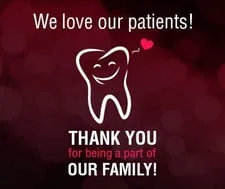Patient Rights
- You have a right to choose your own dentist and schedule an appointment in a timely manner.
- You have a right to know the education and training of your dentist and the dental care team.
- You have a right to arrange to see the dentist every time you receive dental treatment, subject to any state law exceptions.
- You have a right to adequate time to ask questions and receive answers regarding your dental condition and treatment plan for your care.
- You have a right to know what the dental team feels is the optimal treatment plan as well as the right to ask for alternative treatment options.
- You have a right to an explanation of the purpose, probably (short and long-term) results, alternatives, and risks involved before consenting to a proposed treatment plan.
- You have a right to be informed of continuing health care needs.
- You have a right to know in advance the expected cost of treatment.
- You have a right to accept, defer, or decline any part of your treatment recommendations.
- You have a right to reasonable arrangements for dental care and emergency treatment.
- You have a right to receive considerate, respectful, and confidential treatment by your dentist and dental team.
- You have a right to expect the dental team members to use appropriate infection and sterilization controls.
- You have a right to inquire about the availability of processes to mediate disputes about your treatment.
(Adopted by the American Dental Association in 2009)
Your Responsibilities as a Patient
- You have the responsibility to provide, to the best of your ability, accurate, honest, and complete information about your medical history and current health status.
- You have the responsibility to report changes in your medical status and provide feedback about your needs and expectations.
- You have the responsibility to participate in your health care decisions and ask questions if you are uncertain about your dental treatment or plan.
- You have the responsibility to inquire about your treatment options and acknowledge the benefits and limitations of any treatment that you choose.
- You have the responsibility for consequences resulting from declining treatment or from not following the agreed-upon treatment plan.
- You have the responsibility to keep your scheduled appointments.
- You have the responsibility to be available for treatment upon reasonable notice.
- You have the responsibility to adhere to regular home oral health care recommendations.
- You have the responsibility to ensure that your financial obligations for health care received are fulfilled.
(Adopted by the American Dental Association in 2009)
American Dental Association Leads Fight for Patient Rights
The American Dental Association has supported legislation that will set a few basic rules to promote high-quality care and protect patients in an increasingly bottom-line-driven healthcare system.
ADA-member dentists have been instrumental in moving the patients' rights issue into the national spotlight. The nation appears closer than ever to finally seeing a comprehensive patient bill of rights passed into law.
While Congress debates various versions of patient rights legislation, the insurance and managed care industries have long supported legislation that would fail to protect all privately insured Americans against unfair delays and denials of coverage by their health plans, according to the ADA. Some ill-fated bills left out critical protections, such as guaranteeing people the option of choosing their own doctors or creating mechanisms to address patients' grievances against health plans. One proposal even omitted freestanding dental plans, which could have left more than 120 million dental patients without these vital protections.
The American Dental Association continues to lobby for the enactment of bipartisan legislation to help ensure that health plans treat patients fairly and do not discriminate against dentists. Here are some of the key issues identified by the ADA:
- Coverage for freestanding dental plans, which account for the vast majority of Americans who have dental coverage.
- Patient choice, by guaranteeing access to at least one plan with a point-of-service option that allows patients the opportunity to choose their own doctors.
- Health plan accountability, through the availability of impartial, external review and by holding plans accountable when their decisions to delay or deny care harm patients.





